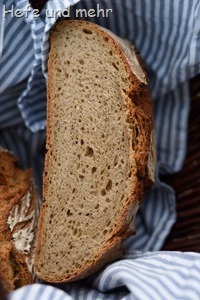 This Farmers bread is the right bread for every one who is looking for a rustic bread for busy weeknights. It uses the same principle like the summer evening bread: boiled sourdouhg. To enhance the sourdough flavour I allowed the rye sourdough to ripen for a long time. This can be troublesome in busy weeks but boiled sourdough has one major advantage: It can be prepared one week in advance. So all you have to do is making it on a not so busy day (maybe at the weekend?) and keep it in the fridge until needed. Then you have a “ready to use” sourdough at hand every day of a week.
This Farmers bread is the right bread for every one who is looking for a rustic bread for busy weeknights. It uses the same principle like the summer evening bread: boiled sourdouhg. To enhance the sourdough flavour I allowed the rye sourdough to ripen for a long time. This can be troublesome in busy weeks but boiled sourdough has one major advantage: It can be prepared one week in advance. So all you have to do is making it on a not so busy day (maybe at the weekend?) and keep it in the fridge until needed. Then you have a “ready to use” sourdough at hand every day of a week.
In this case it is used for flavour and tiny tangy flavour in this bread which contains about 70% Spelt and 30% rye. Such a rustic bread gain a lot from a tiny amount of bread spice added to the dough. I opted for a small amount which only underlines the complex flavours of the long and cold fermentation. But of course you are free to adjust this amount to your taste: use more for a stronger flavour or leave it away if you do not like it. The mixture can be varied as well. I normally opt for same parts of fennel, caraway and coriander seeds.
Dinkel-Bauernbrot (Feierabend-Variante)
- 50g rye flour Type 1150
- 50g Water
- 5g sourdough
boiled sourdough
- sourdough
- 400g Water
Dough
- boiled sourdough
- 200g rye flour Type 1150
- 750g spelt flour Type 630
- 250g Water
- 20g Salt
- 20g Butter
- 20g inactive Malt
- 15g Bread spice (optional)
- 5g fresh yeast
In the morning mix water, flour and starter for the sourdough and ferment for about 18 hours at 25°C.
For the boiled sourdough mix sourdough with water and bring to boiling while stirring. Let cool down before using. Boiled sourdough keeps well in the fridge for about 1 week!
In the evening knead all ingredients 3 min at the slowest speed and 10 min at higher speed until medium gluten development.
Let rise in the fridge for 16-24 hours.
Divide the dough into two parts. Form to long loaves and place in the proofing basket seam side up.
Proof for 2 hours, heat the baking stone at 250°C in the meantime.
Prior to baking, slash the loaves lengthwise and place the breads in the oven with steam. Turn the temperature back to 180°C after 10 min, relase the steam and bake the bread for another 45 min .
Deutsch




Hallo Stefanie,
Sag mal, lässt du den Teig vor der kalten Gare noch im Raum anspringen?
Viele Grüße und Kompliment für alle Deine Rezepte,
Alex
@Alexander: Nein, der Teig kommt direkt in den Kühlschrank. Da es einige Stunden dauert, bis der Teig vollständig runtergekühlt ist, reicht das für die Hefe völlig.
Liebe Stefanie
Habe soeben den Teig angesetzt. Die 10 min bei schneller Geschwindigkeit haben mich etwas irritiert bei dem hohen Dinkelanteil… hab nach 5 min gestoppt. Ich weiss, dass die Knetdauer sehr unterschiedlich ausfallen kann, ansonsten sind deine Angaben für meine Maschine aber sehr stimmig.
Hallo,
werden beim Kochen des Sauerteigs nicht die Hefen abgetötet?
Für much klingt das Rezept so, dass der Teug durch die 5g Hefe, die ja Zeit hat, sich zu vermehren, aufgeht.
Neugierige Grüße
Andrea
Andrea: Genau das ist die Idee, allerdings geht es mehr um das Abtöten der Milchsäurebakterien und inaktivieren der Sauerteig-Enzyme. 😀 Wenn du den (auch oben im Text verlinkten) vorherigen Feierabendbrot-Artikel ansiehst, findest du mehr Infos über das wieso und warum plus einen weiteren Link zu einem Zeitschriftenartikel.
Hallo Stefanie,
tolles Rezept, wird nach dem Urlaub ausprobiert. Nimmst Du dafür den süßen Starter?
Übrigens mache ich immer noch die saftigen Kamut-Einkorn Kissen gerne, aus Deinem Kurs.
Schöne Ferien noch und Grüße aus Waldbröl.
Nina Bellingen
Nina Bellingen